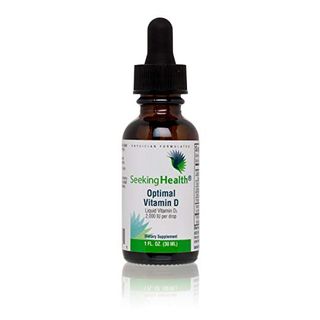The Reason You're Sad This Winter (and It's Not Seasonal Affective Disorder)

To be human is to be sad in the winter. Those post-holiday, low-sunlight, cold-weather vibes hit in early January, and by default, we often attribute our depleted mood to seasonal affective disorder—a buzzy, though very real, condition caused by hormonal changes and a lowered serotonin production in the wintertime. However, there's actually a markedly less talked-about but even more real culprit for your wintertime sadness: vitamin D deficiency.
We've all heard of vitamin D, but here's a refresher on what it is and what it does. It's is a fat-soluble vitamin responsible for calcium homeostasis and bone health, explains Tsippora Shainhouse, MD, a board-certified dermatologist and pediatrician in Los Angeles. Healthy levels of vitamin D are shown to slow skin aging, promote healthy immune function and bone growth, and improve mood. According to Rachel Fine, a registered dietitian and owner of NYC nutrition counseling firm To the Pointe Nutrition, signs of vitamin D deficiency may include frequent colds, lower back pain, chronic aches, and fatigue and depression.
Vitamin D deficiency is bad for your mood because it plays a role in the synthesis of dopamine and serotonin, both of which are important for a healthy mood and sense of well-being. "If you're deficient in vitamin D, your ability to make adequate amounts of these neurotransmitters falls and you may find that you're feeling pretty blah," explains Callie Exas, a Brooklyn-based registered dietitian. "Vitamin D also plays a role in the regulation of our stress and sleep regulation, so a deficiency can increase inflammation, which can also affect mood."
The effects of vitamin D deficiency can get particularly bad in the cold-weather months due to a lack of exposure to sunlight. "Vitamin D is produced out of cholesterol in the skin when it is exposed to sunlight," says Fine. Shorter days, weaker sun, and less time outside equal fewer opportunities to produce vitamin D. Those who don't eat much (or any) meat or dairy may also be at an increased risk because many food sources of vitamin D include animal-based products like eggs and fish.
Suspect you might be vitamin D deficient? A simple blood test at your doctor's office can confirm. "The lab should measure the level of bioavailable vitamin D, which is D3 (the type that the skin makes). There is a range of normal, low normal, moderate, and severe deficiency."
If you are indeed deficient, experts recommend incorporating more vitamin D–packed foods into your diet. If you eat animal products, try adding more fatty fish (like salmon and tuna) and egg yolks to your diet. For those off dairy and meat, go for fortified orange juice and cereals. A daily vitamin D supplement of 600 to 800 IU is also recommended. "When it comes to vitamin D supplements, it's best to take the pill (even if a calcium/D combined pill) as part of a meal that contains fats and oils, as this may increase absorption of those D," says Fine. "With that said, always follow instructions on your supplement, as directions may differ slightly for each."
Next up: 10 winter coats celebrities are wearing this season.
Disclaimer
This article is provided for informational purposes only and is not intended to be used in the place of advice of your physician or other medical professionals. You should always consult with your doctor or healthcare provider first with any health-related questions.

Who's your beauty icon?
Tie among Linda Rodin, Hari Nef, and David Bowie.
Who are your 5 favorite people to follow on Instagram?
@petracollins @katiejanehughes @alwaysjudging @bonnyrebecca @hotdudesreading
What's the beauty essential you can’t live without?
If I have some brow gel and Sisley's Phyto-Lip Twist, I'm good to go forever.
What's your desert island album?
Death Cab for Cutie's Transatlanticism
What's your favorite Byrdie.com story?
Game of Thrones's Nathalie Emmanuel looks so achingly beautiful in our feature with her that I think it's gonna have to be that!



